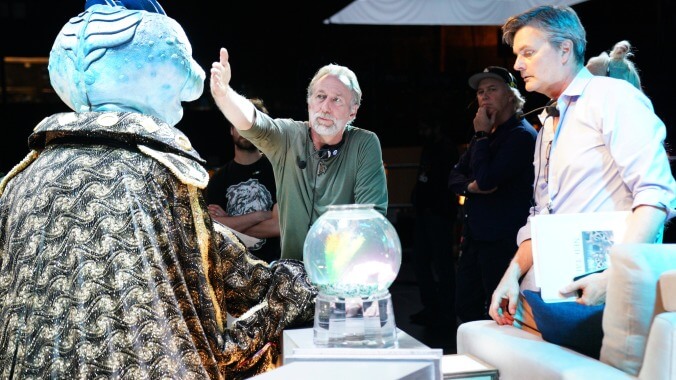How do you get six puppeteers to improvise as one alien talk show host? Ask Brian Henson


Brian Henson has been involved in the family business, one way or another, for almost his entire life. The eldest son of Jim and Jane Henson made appearances in Sesame Street shorts as a youngster, helped Kermit The Frog and friends ride bikes as a teen, and in recent years oversaw new onscreen additions to the universes of Fraggle Rock and The Dark Crystal. He’s been at the head of The Jim Henson Company for nearly 30 years now, steering it through the wake of his father’s death, in 1990, directing a pair of Muppet features in the mid-’90s, and bringing an improv-informed style of puppetry to productions like the stage show Puppet Up! and the Paul F. Tompkins-hosted news parody No, You Shut Up! The Henson Company’s newest project is in that vein as well: Earth To Ned, a faux-late-night talk show fronted by a renegade alien commander, Ned, who beams human celebrities aboard his spacecraft to engage in games and chitchat with a band of intergalactic misfits. Prior to the series’ debut on Disney+, The A.V. Club spoke with Henson about the qualities of the ideal Earth To Ned guest, the peculiar chemistry of Henson-Disney team-ups (the latter purchased the Muppet Show characters from the former in 2004), and what it takes to get six different performers to work in concert and bring to life one extraterrestrial host who’s fascinated by people but also with himself.
The A.V. Club: Can you walk us through the origins of Earth To Ned? What got you excited about doing a Henson spin on a late-night talk show?
Brian Henson: Well, it started with Jim Henson’s Creature Shop Challenge, where I was working with Joseph Freed and Allison Berkley, who are Marwar Junction Productions, our producing partners on this. At the end of Creature Shop Challenge, we were very sad the show couldn’t get picked up [for a second season], but we were very excited about animatronics coming off of that show and how much the audience loved us doing proper animatronics again. So we came up with something’s that actually quite similar [to Earth To Ned]. Initially it was called Ned Talks—but the TED Talks people said, “No, no, no: You’re not calling it Ned Talks.” The idea was that these aliens have been monitoring Earth through television broadcasts, and they’re super excited about Earth because they’re super excited about television. That’s where it started from, and then we started adding the idea that they can beam in celebrities from television. They don’t realize they’re actors—they think they really are the people that they [play on TV]. And then we were talking to Dan Silver at Disney+, and he said what he was looking for was unscripted shows [where] you could recognize the format, but it was done in such a different way. [Earth To Ned] became a little bit more of a late-night talk show format than it was. It was a little weirder, probably, and Dan wanted you to know that you’re watching a late-night talk show format. Which was really good, because it tethered us. We could’ve gone a little bit too crazy. We’re breaking format on a few episodes, but basically it’s two guests and a field piece in every episode.
One of the things that excited me the most was this character of Ned, who loves people. Everything about them excites him. He’s had an awakening, because he’s hated his life: He’s a military commander who should never have been in the military. He’s kind of been in the closet his whole life, and now he’s met people, and it’s so exciting—it’s opened up the universe for him. Now he’s finally blossomed. Taking that point of view and putting it in the host’s chair is a very fresh choice. And very positive. Most late-night talk shows are very cool and slightly sarcastic and a little cynical. And this is anything but that. Ned is ignorant and totally enthusiastic about everything. And it creates a show that is a celebration of everything about us: our faults and our strengths.
One would think if you want it to be very clear that it’s a late-night talk show, that it should be on a late-night talk show set. Because they all almost look identical. But Dan allowed us to go the opposite direction, and he allowed us to do really creative worlds. It’s a proper science-fiction spaceship that they’re in, and they plunked an IKEA couch in the middle of the set [Laughs.] where the guests are going to sit. It was lovely that they allowed us to do that because then the late-night talk show grounded it in something you expect, but everything about the way it’s presented is totally unexpected.
AVC: Once you had that defining, humanity-loving trait in place for Ned, how soon afterward did you have Paul Rugg in mind as the character’s main performer? Going back as far to a character like Freakazoid, that type of enthusiasm feels like a note that Rugg is particularly attuned to playing.
BH: And it tends to be my first choice when I’m performing, too. I needed great improvisers, and I needed the combination of Cornelius and Ned to be really special. So we did exhaustive casting among the puppeteers to find out who Ned was, and exhaustive casting to figure out who Cornelius was. And then we basically took the top five from each and did every combination to see what was the greatest combination. And that’s what brought us to Paul Rugg and Michael Oosterom. If you asked me in advance, I have several performers who can perform in that area very, very well. But I’m not surprised that Paul rose to the top.
And then he brought a lot of Paul to it: He was able to bring more flaws than I thought we were going to be able to get away with. I knew that the audience needed to love Ned, but Paul was very artful at making Ned a real narcissistic jerk sometimes. And when he’s got his guests on, he doesn’t want them to have more attention than him. [Laughs.] And that was largely Paul, who was saying, “We can push this harder.” And he was right.
 Keep scrolling for more great stories.
Keep scrolling for more great stories.
